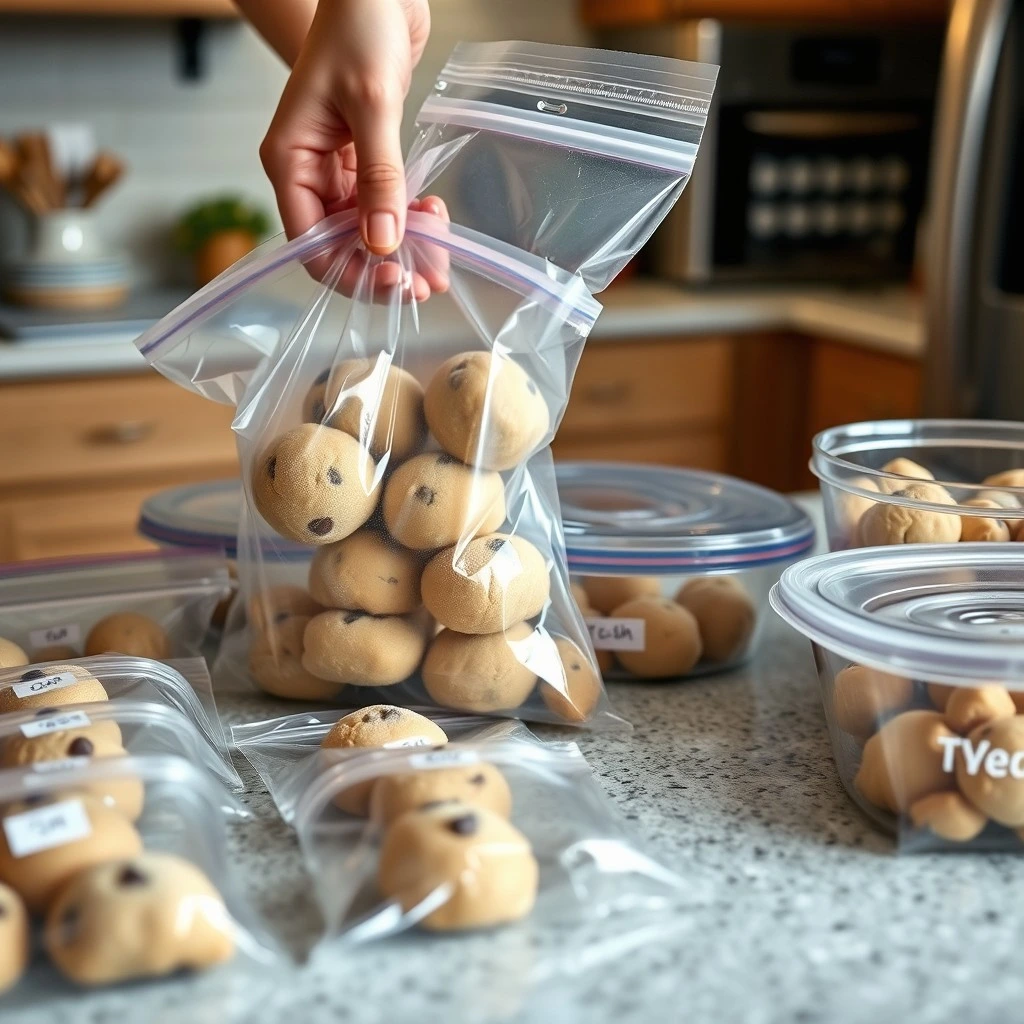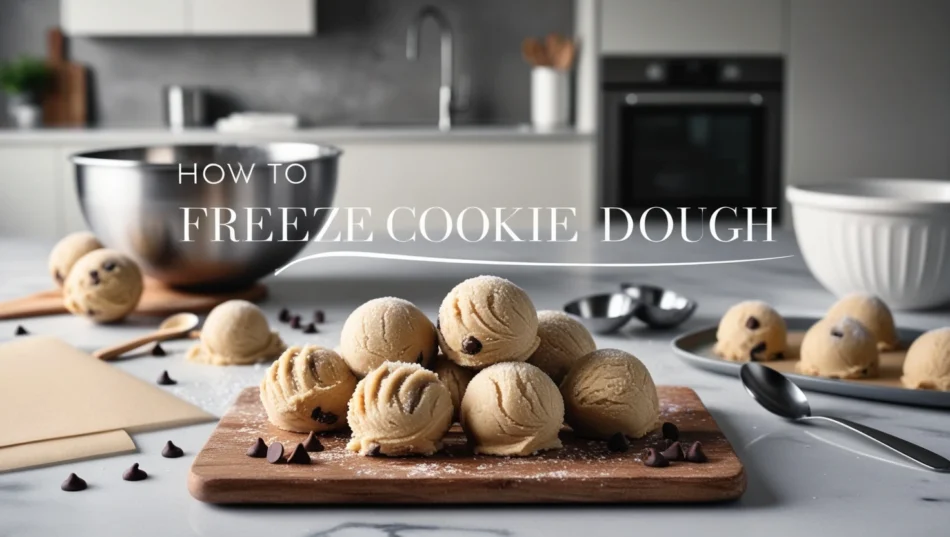Table des matières
Baking cookies from scratch is a tradition in many households, bringing warmth and sweetness to any occasion. However, the process can be time-consuming, especially when unexpected guests arrive or when you crave a fresh batch at a moment’s notice. Enter frozen cookie dough—a versatile solution that combines convenience with the delightful taste of homemade cookies. This comprehensive guide will explore everything you need to know about frozen cookie dough, including how to freeze baked cookies, create perfect frozen chocolate chip cookies , understand how long you can freeze cookie dough, and master the art of baking frozen cookie dough. Let’s dive into frozen cookie dough and elevate your baking game!
Introduction
Baking is more than just a culinary activity; it’s a way to express creativity, share love, and create lasting memories. Yet, the time and effort required can sometimes be a hurdle. This is where frozen cookie dough shines, offering a practical solution without compromising on taste or quality. Whether you’re a busy parent, a novice baker, or someone who simply loves the idea of having freshly baked cookies on demand, understanding the ins and outs of frozen cookie dough can transform your baking routine.
In this guide, we’ll explore the myriad benefits of freezing cookie dough, the best practices for freezing and storing both dough and baked cookies, and expert tips to ensure your frozen treats are always perfect. We’ll also delve into the beloved classic—frozen chocolate chip cookies—and provide insights to make them even more irresistible. By the end of this article, you’ll be equipped with all the knowledge needed to make the most out of your frozen cookie dough.
The Benefits of Frozen Cookie Dough
Freezing cookie dough isn’t just a trend; it’s a practical approach that offers numerous advantages:
- Convenience: Having pre-portioned dough ready to bake means you can whip up a batch of cookies anytime without the need to start from scratch.
- Freshness: Frozen dough maintains its quality, ensuring that each cookie tastes just as good as when it was freshly made.
- Time-Saving: Bulk preparation and freezing reduce the time spent on repeated measuring and mixing, and it is useful during busy periods.
- Customization: Freezing allows you to experiment with different flavors and mix-ins without the pressure of immediate baking.
- Extended Shelf Life: Properly frozen cookie dough can last for months, minimizing waste and maximizing enjoyment.
These benefits make frozen cookie dough an invaluable tool in any baker’s arsenal, offering flexibility and ensuring that delicious treats are always within reach.
How Long Can You Freeze Cookie Dough?
One of the most common questions about frozen cookie dough is, how long can you freeze cookie dough? The answer varies based on the type of dough and the storage conditions, but generally:
- Standard Cookie Dough: Can be frozen for up to 3 months without a significant loss in quality.
- Rich or Filled Doughs: Doughs containing ingredients like nuts, caramel, or chocolate chunks may have a slightly shorter freezer life, typically around 2-3 months.
- Gluten-Free or Vegan Doughs: These can also be frozen for up to 3 months, but always check the recipe specifics as some ingredients may affect longevity.
To ensure maximum freshness, always store the dough in airtight packaging and label it with the date of freezing. Proper storage not only preserves the flavor and texture but also helps you keep track of how long the dough has been frozen.
How to Freeze Cookie Dough
Freezing cookie dough correctly is essential to maintain its quality and ensure successful baking later. Here’s a step-by-step guide on how to freeze cookie dough effectively:
Preparing the Dough

- Make the Dough: Start by preparing your cookie dough according to your favorite recipe. Ensure all ingredients are thoroughly combined.
- Chill the Dough: Refrigerate the dough for at least an hour before freezing. Chilling firms up the fat in the dough, making it easier to handle and portion.
Portioning the Dough

Portioning the dough before freezing lets you bake only what you need without having to thaw the entire batch.
- Scoop the Dough: Use a cookie scoop or a tablespoon to portion the dough into individual servings. This helps in achieving uniform cookie sizes.
- Pre-Freeze Portions: Place the dough portions on a baking sheet lined with parchment paper, ensuring they are not touching each other.
- Freeze Until Firm: Transfer the baking sheet to the freezer and freeze the dough portions for about 1-2 hours until they are solid.
Packaging for Freezing

Portioning the dough before freezing lets you bake only what you need without having to thaw the entire batch.
- Move the Solidified Dough Portions to Airtight Freezer Bags or Containers.
- After the dough portions become firm, move them into airtight freezer bags or containers. Removing as much air as possible helps prevent freezer burn.
- Label and Date: Clearly label the bags with the type of cookie and the date it was frozen. This aids in tracking freshness and managing your freezer space efficiently.
- Separate by Dough Type: To prevent mixing flavors when freezing different doughs, place each type in its bag or container.
By following these steps, your cookie dough will be perfectly preserved and ready to bake whenever the craving strikes.
Baking Frozen Cookie Dough
Mastering baking frozen cookie dough ensures that your cookies turn out perfectly every time, whether you bake them directly from frozen or after thawing.
Direct Baking from Frozen

One of the standout advantages of frozen cookie dough is the ability to bake directly from the freezer, saving you time and effort.
- Preheat the Oven: Set your oven to the temperature specified in your recipe, typically between 350°F to 375°F (175°C to 190°C).
- Prepare Baking Sheets: Line your baking sheets with parchment paper or silicone baking mats to prevent sticking.
- Place Dough on Sheets: Remove the desired number of frozen dough portions from the freezer. Place them on the prepared baking sheets, leaving adequate space between each to allow for spreading.
- Adjust Baking Time: Baking frozen dough may require an additional 2-3 minutes compared to fresh dough. Keep an eye on the cookies and look for visual cues like golden edges and set centers.
- Cool Properly: Allow the cookies to cool on the baking sheet for a few minutes before transferring them to a wire rack to cool completely.
Direct baking is incredibly convenient, especially when you need a quick batch of cookies without prior preparation.
Thawing Before Baking
While direct baking is convenient, some recipes or personal preferences may benefit from thawing the dough first.
- Thaw in the Refrigerator: Move the frozen dough from the freezer to the refrigerator and allow it to thaw overnight. This slow thawing process preserves the dough’s structure.
- Room Temperature Thawing: If you need the dough thawed more quickly, leave it at room temperature for about 20-30 minutes. Ensure the dough remains cool to prevent it from becoming too soft.
- Bake as Usual: Once thawed, bake the dough according to the original recipe instructions, adjusting the baking time if necessary.
Thawing can sometimes lead to a slightly different texture, so it’s essential to experiment to see which method works best for your preferred cookie consistency.
Tips for Baking Perfect Frozen Cookies
Achieving perfectly baked cookies from frozen dough requires attention to detail and a few insider tips:
- Uniform Size: Ensure all dough portions are of the same size to promote even baking. Using a cookie scoop can help maintain consistency.
- Avoid Overcrowding: Leave enough space between cookies on the baking sheet to allow for spreading. Overcrowding can lead to uneven baking and misshapen cookies.
- Consistent Freezer Temperature: Maintain a consistent freezer temperature to prevent partial thawing and refreezing, which can affect dough texture.
- Use Quality Ingredients: High-quality ingredients contribute significantly to the final taste and texture of your cookies. Fresh ingredients yield the best results.
- Monitor Baking Time: Since frozen dough may bake faster, keep a close watch to prevent overbaking. Start checking a couple of minutes before the suggested baking time.
- Rotate Baking Sheets: If baking multiple sheets at once, rotate them halfway through the baking process for even heat distribution.
- Proper Cooling Time: Allow cookies to cool adequately on the baking sheet to set properly before transferring to a wire rack. This helps achieve the desired texture.
Implementing these tips will help you master the art of baking frozen cookie dough, ensuring every batch is as delightful as the first.
How to Freeze Baked Cookies
Freezing isn’t just for dough; you can also freeze baked cookies to extend their shelf life and enjoy them later. Here’s how to do it effectively:
Cooling Properly
Before freezing baked cookies, it’s crucial to let them cool completely to prevent condensation, which can lead to freezer burn.
- Proper Cooling: Let the cookies sit on the baking sheet for a few minutes after removing them from the oven, then move them to a wire rack to finish cooling. This ensures that moisture doesn’t get trapped in the packaging.
- Ensure Complete Cooling: Make sure the cookies are entirely cool to the touch before packaging. Warm cookies can create steam, leading to soggy or freezer-burned cookies.
Packaging Baked Cookies
Proper packaging preserves the freshness and flavor of baked cookies.
- Use Airtight Containers: Store cookies in airtight containers or freezer-safe bags to protect them from moisture and odors.
- Layer with Parchment Paper: If stacking cookies, place parchment or wax paper between layers to prevent sticking.
- Label and Date: Clearly label the containers with the type of cookie and the date of freezing. This helps in tracking freshness and managing your freezer space.
- Portion Appropriately: Freeze cookies in portions that match your typical serving sizes for easy access. This way, you can grab exactly what you need without having to thaw the entire batch.
Baked cookies can typically be frozen for up to 3 months. When ready to enjoy, simply thaw them at room temperature or warm them briefly in the oven to revive their freshness.
Frozen Chocolate Chip Cookies
Frozen chocolate chip cookies are a classic favorite, beloved for their rich, buttery flavor and melty chocolate chunks. Here’s how to make the most out of this timeless treat.
Special Tips for Chocolate Chip Cookies
- Choose High-Quality Chocolate: Using high-quality chocolate chips or chunks enhances the flavor and texture of your cookies. Consider mixing different types of chocolate for a more complex taste.
- Don’t Overmix the Dough: Overmixing can lead to tough cookies.
- Stir Only Until Combined: Mix the ingredients until blended to ensure the cookies remain tender.
- Chill the Dough: Even before freezing, chilling the dough in the refrigerator helps prevent excessive spreading during baking, resulting in thicker, chewier cookies.
- Add Mix-Ins Wisely: If you like adding nuts, dried fruits, or other mix-ins, incorporate them into the dough before freezing to ensure even distribution.
- Experiment with Flavors: Enhance your chocolate chip cookies by adding a pinch of sea salt, a dash of espresso powder, or a sprinkle of cinnamon to elevate their flavor profile.
By following these tips, your frozen chocolate chip cookies will consistently turn out delicious, satisfying treats every time.
Common Mistakes to Avoid When Freezing Cookie Dough
Even with the best intentions, some common mistakes can hinder your success in freezing and baking cookie dough. Here’s what to watch out for:
- Freezing Dough with Perishable Ingredients: Ingredients like eggs or dairy can affect the freezing process. Ensure your recipe is freezer-friendly or modify it accordingly.
- Improper Packaging: Leaving air in the packaging can lead to freezer burn. Use airtight containers or vacuum-sealed bags to protect your dough.
- Over-Thawing: Thawing dough too long at room temperature can cause it to become too soft, leading to uneven baking and Distorted cookies.
- Incorrect Baking Temperature: Using the wrong temperature can result in undercooked centers or burnt edges. Always preheat your oven and use an accurate thermometer.
- Ignoring Portion Sizes: Uneven portion sizes can cause cookies to bake unevenly. Use a consistent measuring tool for dough portions to ensure uniformity.
- Skipping the Pre-Freeze Step: Not pre-freezing dough portions before packaging can cause the dough to stick together, making it difficult to separate when you want to bake.
- Using Reused Freezer Bags: Reusing freezer bags without proper cleaning can lead to odor transfer and contamination. Always use fresh bags for freezing dough.
Avoiding these pitfalls ensures that your frozen cookie dough remains high-quality and bakes into perfect cookies every time.
Frequently Asked Questions
How long can you freeze cookie dough?
For optimal freshness, freeze cookie dough within three months. Properly stored in airtight packaging, it maintains its quality and flavor during this period.
Can you bake cookie dough straight from the freezer?
Yes, you can bake cookie dough straight from the freezer. You may need to add a few extra minutes to the baking time to account for the frozen state.
What’s the most effective way to thaw frozen cookie dough?
The best way to thaw frozen cookie dough is to transfer it to the refrigerator and let it thaw overnight. For quicker thawing, leave it at room temperature for about 20-30 minutes.
Do frozen cookies taste as good as fresh ones?
When properly frozen and baked, frozen cookies can taste just as good as fresh ones. Reheating methods can enhance their freshness and texture.
Can I freeze different types of cookie dough together?
It’s best to freeze different types of cookie dough separately to prevent flavors and textures from mixing.
How can I stop cookies from spreading too much when baking from frozen dough?
Chilling the dough before freezing and ensuring the oven is properly preheated can help prevent excessive spreading.
Can I freeze-baked cookies and then thaw them?
Yes, baked cookies can be frozen and later thawed. Make sure they are stored properly to maintain their texture and flavor.
Are there any types of cookies that don’t freeze well?
Cookies with delicate structures or high moisture content may not freeze as well. It’s best to experiment with small batches first.
How to add mix-ins to frozen cookie dough?
It’s best to add mix-ins like chocolate chips or nuts before freezing. If you need to add them after thawing, gently fold them into the dough before baking.





